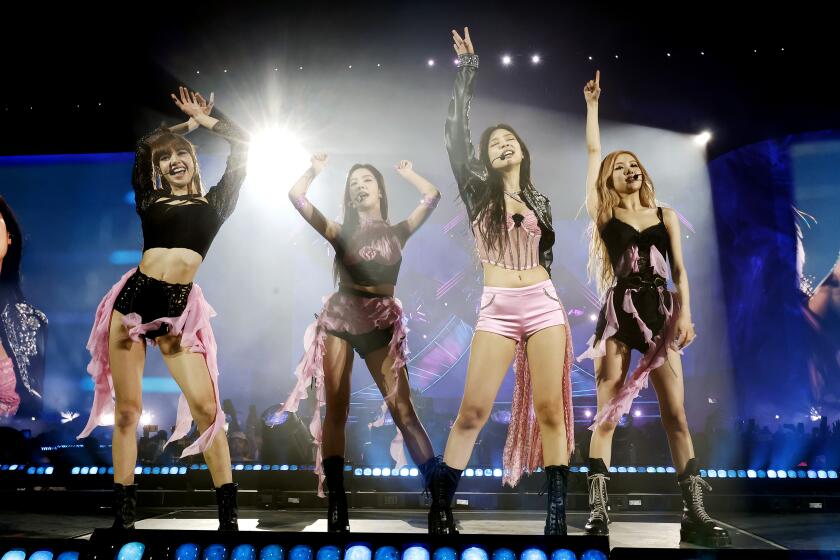Perspective: Bruce Springsteen is aging just fine on Broadway
- Share via
Reporting from New York City — Marrying rock ’n’ roll and Broadway has long been a challenge.
Jukebox musicals, for instance, tend to incorporate some of the most beloved and influential songs of the rock era in theatrical productions aimed at audiences more interested in dressing up for a toe-tapping evening of polite theater rather than a hot and sweaty, roof-rattling, decibel-cranking night in a smoky nightclub.
As far back as 1989 with “Buddy — The Buddy Holly Story,” on through shows built on music of the Beatles, Elvis Presley, Motown, Sun Records and others, there’s always been a certain something missing, at least for this viewer and lifelong rock fan.
For my money, the element that few, if any, theater producers and directors have successfully harnessed has been the authentic, liberated and liberating in-and-of-the-moment spirit of rock ’n’ roll.
That’s a key part of what makes Bruce Springsteen’s current one-man show, “Springsteen on Broadway,” such a wondrous anomaly, despite at least three decades of efforts by various parties to bring some of the spirit of rock to the Great White Way.
As smartly scripted as Springsteen’s show is, skillfully touching on different phases of his life in parallel with his recent autobiography “Born to Run,” my conclusion after belatedly catching up with “Springsteen on Broadway” last week on a trip to New York is that it’s not fundamentally different than the countless Springsteen concert performances I’ve attended over the last 40 years, starting in 1978 when I first saw him live at the Forum in Inglewood on his “Darkness On the Edge of Town” tour.
In a nutshell, a Springsteen concert is a lot of music with some illuminating monologues between inspiring songs. “Springsteen on Broadway” is a lot of illuminating monologues separated by inspiring songs. Among the cornerstone Springsteen hits and deeper cuts in the show are “Born to Run,” “Thunder Road,” “Dancing in the Dark,” “My Hometown,” “Growin’ Up,” “Brilliant Disguise,” “Tougher Than the Rest” and “The Ghost of Tom Joad.”
It’s Springsteen on the same pulpit he’s always taken, whether backed by the venerable E Street Band, in solo shows or during the great string of performances he did a decade or so back with the expanded forces of the folk-country-gospel minded Sessions Band.
As my colleague, theater critic Charles McNulty, so succinctly noted in reviewing the show when it opened nearly a year ago: “Toward the end of the two-hour intermission-less show, he intones The Lord’s Prayer, but by then it’s clear that ‘Springsteen on Broadway’ is for him a kind of sacrament.”
My only update to that assessment is that 10 months down the road, the show now stretches closer to two hours and 45 minutes, nearing the epic nature of typical Springsteen/E Street Band marathons that run three or often even four hours.
For Springsteen, playing music was never simply a quest for fame or fortune; it’s always been a vehicle for experiencing life to its fullest, for fomenting genuine connection with like-mind human beings and for tapping the power of music to align with something greater than oneself.
“The way I see it,” he writes in his book, “we ate the apple and Adam, Eve, the rebel Jesus in all his glory and Satan are all part of God’s plan to make men and women out of us, to give us the precious gifts of earth, dirt, sweat, blood, sex, sin, goodness, freedom, captivity, love, fear, life and death … our humanity and a world of our own.”
The only thing missing was Springsteen following that with “Can I get an amen!”
In a passage of the show lifted almost verbatim from the book, Springsteen explained to the Walter Kerr Theatre audience last week the special thing that a rock band is: “A real rock ’n’ roll band evolves out of a common place and time. It’s all about what occurs when musicians of similar background come together in a local gumbo that mixes into something greater than the sum of the parts: 1+1=3.
“The primary math of the real world is one and one equals two,” he continues, with the fervor of a preacher on a roll.
“But artists, musicians, con men, poets, mystics and such are paid to turn that math on its head, to rub two sticks together and bring forth fire. Everybody performs this alchemy somewhere in their life, but it’s hard to hold onto and easy to forget.
“People don’t come to rock shows to learn something,” he suggests. “They come to be reminded of something they already know and feel deep down in their gut.”
As I took it all in — including his honest confessions of times in his life when his execution fell short of his ambition — I was reminded of Ray Davies, Garth Brooks, Loudon Wainwright III and Randy Newman.
They are among the small handful of pop figures who have channeled the kind of emotional immediacy and disarming honesty into theatrically minded shows in the manner that distinguishes “Springsteen on Broadway” from so many other pop music-adjacent efforts.
Springsteen’s show has been extended several times from its originally planned engagement of a few weeks, but is now set to close for good on Dec. 15.
The good news, at least for those without the geographical or financial wherewithal to catch the stage production, is that Springsteen and his longtime collaborator, director Thom Zimny, are putting together a film version that is scheduled to premiere on Netflix the same night the live-action version closes.
Follow @RandyLewis2 on Twitter.com
For Classic Rock coverage, join us on Facebook
More to Read
The biggest entertainment stories
Get our big stories about Hollywood, film, television, music, arts, culture and more right in your inbox as soon as they publish.
You may occasionally receive promotional content from the Los Angeles Times.










